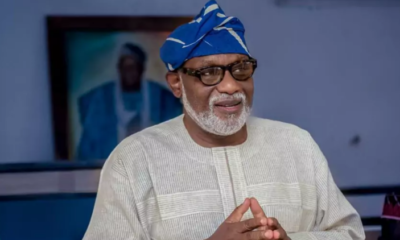Politics
Impeachment: Embattled Deputy Governor Asks Court To Stop Akeredolu’s New Move

Abuja, Oct. 30, 2023 (NAN) The Ondo Deputy Governor, Mr Lucky Aiyedatiwa, on Monday prayed a Federal High Court in Abuja to dismiss Gov Rotimi Akeredolu’s application seeking to set aside the Sept. 26 interim order restraining the state assembly from initiating an impeachment process.
The deputy governor’s Counsel, Mr Ebun-Olu Adegboruwa, SAN, prayed Justice Emeka Nwite to dismiss the oral application by Akeredolu’s Lawyer, Mr Kassim Gbadamosi, SAN, and counsel to other defendants, insisting that they lacked locus (legal right) to canvass such argument.
The News Agency of Nigeria (NAN) reports that Justice Nwite had, on Oct. 16, fixed today for hearing preliminary objections by Akeredolu, Ondo State House of Assembly and its speaker for today.
The judge also fixed hearing in Aiyedatiwa’s substantive suit and other processes for today, besides adjourning to rule on their arguments whether the court should discontinue the suit or not.
The judge had, on Sept 26, restrained the state’s assembly from impeaching Aiyedatiwa over alleged gross misconduct.
Nwite gave the interim order in a ruling shortly after Aiyedatiwa’s counsel, Kayode Adewusi, moved the ex-parte motion to the effect.
He also restrained Akeredolu from nominating a new deputy governor and forwarding same to the lawmakers for an approval as the new state’s deputy governor based on a letter of resignation purportedly authored or signed by Aiyedatiwa, pending the hearing and determination of the interlocutory application.
The embattled deputy governor had, in an ex-parte motion marked: FHC/ABJ/CS/1294/2023, sued the I-G and DSS as 1st and 2nd defendants.
Others joined in the suit include Akeredolu, Speaker of the House of Assembly, Chief Judge of Ondo State and the House of Assembly as 1st to 6th respondents respectively.
In the application dated and filed by Mr Adelanke Akinrata on Sept. 21, Aiyedatiwa sought for four reliefs.
When the matter was called, Adegboruwa notified the court that the speaker and the assembly (4th and 6th defendants) filed a notice of appeal and subsequently filed their brief of appeal on Oct. 20 against the Sept. 26 interim order of the trial court and that the appeal had been entered on Oct. 20 contrary to their arguments.
He, therefore, prayed the court to adjourn the case sine die (indefinately) to await the decision of the Court of Appeal.
He urged the judge to allow parties go to the appellate court in order not to waste the time of the court on arguments on whether it had jurisdiction or not and to avoid contesting with the superior court.
Adegboruwa, who prayed the court to allow them proceed to Appeal Court, said it was at the request of the speaker and the assembly because they had shown that they did not have confidence in the court.
Besides, he said the appellants also filed an application before the upper court to abridge the time to hear the matter, hence, it would soon be ripe for hearing
But Akeredolu’s counsel, Gbadamosi, disagreed with Adegboruwa, saying such submission could be likened to a stay of proceedings.
He argued that such application was unknown to law, asking “whether he (Adegboruwa) has made an application for stay of proceedings on an appeal which he did not file.”
“It is as if it is a stay of proceedings when there is no such application before your lordship, especially when he did not file a notice of appeal,” he said.
The senior lawyer, who admitted that an appeal was filed by two of the defendants, said the speaker and the assembly did not file a stay of proceedings to warrant such application.
“There are several parties to this suit and each one of them has the right to approach the court either to set aside or file an appeal within that jurudiction. It is their constitutional right,” he said.
He, however, disagreed that the appeal had been entered at the Court of Appeal, “because they are still trying to perfect the record at the court of appeal.
“Assuming that the record has been entered which we are not conceding, the position of the law is that an appeal will not operate as a stay of proceedings or execution of the order of the court,” citing Order 4, Rule 11(1), 2021, of the Appeal Court.
He said besides their application for the court to set aside the order and their prayer for the suit to be struck out in its entirety, Gbadamosi said the court lacked jurisidtcion to entertain the suit.
According to him, that a party exercised his right to file an appeal does not mean the party does not have confidence in the court as being suggested.
He urged the court to dismiss the suit for lack of jurisdiction.
Gbadamosi also argued that Adegboruwa’s application was akin to arresting the ruling of the court.
“We urge my lord not to accede to the request of arresting your lordship’s ruling and go ahead to deliver it because we are here for ruling and hearing of all pending applications,” he said.
Lawyer to the 4th and 6th defendants’, Femi Emodamori, and counsel for the 5th defendant (chief judge), Mutalubi Adebayo, SAN, and DSS lawyer aligned with Gbadamosi’s submission.
Emodamori also argued that in the event that the court might granted the plaintiff’s application to adjourn indefinately pending the determination of the appeal, the ex-parte order should be set aside.
“Your lordship granted an ex-parte order pending the hearing and determination of the substantive suit, but the learner silk said the court should adjourn sine die pending the application at appeal.
“The implication is that the ex-parte order will be converted to interlocutory injunction , which then become pending the hearing and determination of the entire case, not even here but at appellate court.
“That is a fundamental error my lord. You have to be very weary of the legal implication of that.
Also arguing, Gbadamosi said the defendants were entitled to be heard on their application for the court to vacate the interim order.
He insisted that the order had elapsed, hence, the need to set it aside.
“We urge my lord not to extend the order because your lordship do not have jurudiction to do so.
” I can be overruled but to make the submission is my right.
“Pursuant to Order 26, Rule 10, this court should hold that this order has elapsed and should not be renewed,” he said.
Adegboruwa also disagreed with the lawyers, saying they cannot approbate and reprobate on same issue.
He argued that the defendants cannot asked the court to determine the status of the ex-parte order because such application is prohibited under the same Order 26, Rule 10 that it cannot be made after 14 days of when a party became aware.
Besides, the lawyer argued that the defendants did not have any application before the court challenging the order made on Sept. 26 beyond their appeal.
“My colleague for 4th and 6th defendants said his application is predicated on alleged fundamental development which he never disclosed to the court or plaintiff.
“I urge my lord to decline that application for deliberate concealment of facts and non-disclosure,” he said.
Adegboruwa equally urged the court to hold that that the interim order was the subject matter of the appeal of the 4th and 6th defendants.
“It is our humble submission that this honourable court should not fall for the trap being set by the 4th and 6th defendants to delve into the status of such order as suggested by 4th and 6th defendants.
“First is that all parties today agreed that there is a pending appeal against the said order file by 4th and 6th and they cannot seek my lord’s determination extempore of the status of order which they are prosecuting the appeal,” he said.
According to him, the argument of the 4th and 6th defendants is self defeatist because if they claim that time has expired allegedly for the plaintiff to renew the said order, time has also expire under the same said rule for the defendants to complain of the said order after 14 days of becoming aware by their notice.
“Finally, I urge this honourable court not to overrule itself having directed that the order granted abide till pending motion on notice because Order 26, Rule 10 of the court was already in existence as of the time the Sept. 26 order was made,” he said.
The senior lawyer also disagreed that his application was an attempt to arrest the ruling of the court to continue of discontinue the matter.
Justice Nwite adjourned the matter until Nov. 17 for ruling. (NAN)
Send Us A Press Statement Advertise With Us Contact Us
And For More Nigerian News Visit GWG.NG














